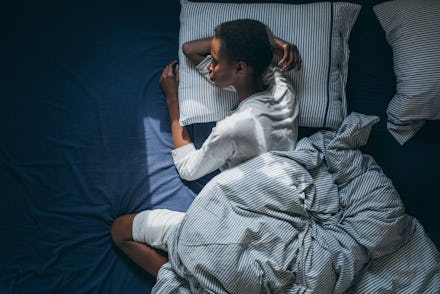A grown person's guide to buying the right mattress

I’ve been sleeping on the same mattress for almost a decade. Folks who sleep over always comment on how comfy it is, but honestly, I find it to have a little too much give. I’ve avoided buying a new one because I always think that if other people think it’s comfortable, it must be okay. Honestly, I don’t know the first thing about how firm a mattress should be, so I asked experts to shed light on how to buy a mattress that will give me blissful sleep for the next decade. The answer, I found, is a bit murky but still enlightening.
Ideal mattress firmness isn’t one size fits all, says Arya Shamie, chief of orthopaedic spine surgery at UCLA Medical Center, and a professor at UCLA School of Medicine. “This is really a matter of preference, but the mattress should not be either too hard or soft,” he says, “Generally speaking, a high-end mattress with a pillow top should be just right for most people.” We’ll get to what high-end means as far as cost in a minute, but I, personally, am aligned with this Goldilocks, “not too hard, not too soft” approach to mattress firmness.
A confession, though: I should know a lot more about mattresses than I do. My mom, Anne Weaver, was a manager at Mattress King for 15 years, so I heard a lot about mattresses, but like most things my mom said when I was a teenager, I only half-heard words like “foam” and “coil.” I know she has insider info from the mattress-buying arena, so I ask for her thoughts. “Everyone needs a firm mattress,” she says, “but the firmness comes from inside the mattress, in other words: the coil system.” The coil system inside the mattress gives you the support that your body requires and the comfort layers (the pillow top, memory foam, latex, etc) are what cradles your body.
My on-paper experts concur and add that our preferences for softness correlate, sometimes, to how thick of a mattress we opt for. The thickness of your mattress should depend on your height, weight, age, medical condition or simply personal preference,” says Terry Cralle, a nurse, clinical sleep educator, and sleep consultant for Saatva, an eco-conscious mattress brand. “Still, you don’t want to have to pole-vault into your bed at night.”
Some of us take the quest for a supportive mattress so seriously that we’d take that Olympic-caliber effort. Keep in mind though, the stakes are not as high they’re hyped up to be. “As long as your spine is not sagging into a mattress, you’re probably okay picking the most comfortable one for you individually,” Shamie says, “I’ve never seen a patient who needed spine surgery because they picked the wrong mattress.”
So while my squishy mattress may not be ideal, I’m probably not going to end up in a full body cast because of it.
All factors considered, buying a mattress online seems like the easiest option. But online retailers can’t take all the variables of body size, shape, and personal preference into account, and experts don’t recommend it. “You should try your mattress before buying it,” Shamie says, “If your mattress is able to support your back in a ‘neutral’ position then that’s the right mattress for you.” Weaver points out that you need to try out more than one mattress to figure out what’s right for you, which is impossible to do online.
“Go to a reputable mattress store and pick a mattress from a reputable company that is most comfortable for you,” Shamie says. A good salesperson will take the time to help you figure out what you need, and buying a mattress in store gives you room to negotiate on price. “A reputable salesperson will 'beducate' you and they will usually match the price of the online store,” Weaver says. And because most sales people work on commision, she said, they’re motivated to work with you.
When you’re in a store, though, don’t let the flash blind you. A higher priced item doesn’t necessarily mean a better night’s sleep. “A quality mattress, made with premium materials, generally costs in the range of $1,000 to $3,500,” Cralle tells me. Hella pricey at first glance, but consider how long you’ll likely have this thing for. A mattress’s life expectancy is typically 8-10 years, or as little as five years if you’re over 40 years old. “The life expectancy of the mattress depends on several factors: the quality and type of mattress, the age of the sleeper, the weight of the sleeper, the health of the sleeper, bed partner issues, pets, kids, to name a few,” Cralle says.
Shamie agrees that you don’t need the most expensive mattress you can afford. “Save some money for your exercise equipment which is as important — if not more — for your health of your spine,” he says, bringing up a valid point: that preventative measures and overall physical health will negate the need to search for the perfect mattress.
Ultimately, there is no one “best” mattress anyway, my experts concur. It depends very much on your lifestyle. The general consensus is that when in doubt, opt for medium-firm. That being said, one person’s “extra firm” could be another’s “medium-firm,” so try the thing out rather than going by the 746 Amazon reviews.